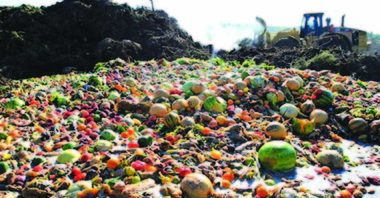165 billion pounds of food wasted each year

Nearly 40 percent of our food goes to waste in the United States. Far too often, food is thrown in the trash and dumped in landfills instead of filling hungry bellies.
You’ll find this waste either in the fields, on the docks, in grocery stores or people’s homes. That’s 165 billion pounds of food every year. It is an astonishing number and one that sadly reflects both the extravagance and the waste seen in one of the richest countries in the world.
Our children and grandchildren will rightly hold us accountable for this tragic misuse of food that has led to the plundering of our land, accumulation of greenhouse gases and the loss of precious water used to grow and produce that wasted food.
There is an unacceptable disconnect between food waste and hunger. How is it possible that we trash this ridiculous amount of food while one in six children (one in eight people of all ages) in the United States is food insecure; unsure when or if they will receive another meal.
After 17 years of traveling the world reporting on both natural and human-made disasters, this particular issue has haunted me more than most. And it is one we can solve.
What is happening in the United States is not a famine by any means, but it is a lot worse than people tend to realize. Despite gains in employment and economic growth, many people you probably know have never really recovered after the recent recession.
They are your friends, neighbors, and colleagues, and a significant percentage of them are staring down empty cupboards and refrigerators.
However, people like Charity Mills of Colorado Springs saw just how much the face of hunger has changed in America. She is educated, eloquent and employed. She also waits in a food bank line most days of the week just to feed her family.
Charity described her situation to me as “the tyranny of the moment.” Today, 41 million people aren’t sure where they’ll find their next meal. For them, it is all they think about.
In the past, Charity and her family qualified for SNAP, the supplemental nutrition assistance program. They used to get about $4.58 a day per person for a family of seven.
Nowadays, Charity and millions of other Americans find themselves in an unforgiving middle ground, not benefiting from the recent improvements in the economy but having their benefits slashed nonetheless.
Her family is still food-insecure but no longer able to qualify for food stamps. The reality: They are now dependent on the generosity of others to eat.
How can we fix this problem?
Fortunately, Americans are among the most generous people on earth. As a result, organizations like can create a web of 200 food banks across the country and help make sure more than 40 million Americans have a good shot at securing their next meal.
America already has enough food to feed everyone if we can just connect the food that is being wasted with the people who so desperately need it.
As with most things, this is trickier than it appears. First off, for big businesses to simply donate food. Because the cost of packing and shipping is pricey, is often easier and cheaper for companies to throw out the extra food. Organizations also worry about the legal risks of donating food, so the Good Samaritan Food Donation act protects good-faith food donors from liability if the recipient should become ill.
Finally, most of us consumers often trash our food much earlier than we should because of somewhat arbitrary “use by” and “sell by” dates. These dates aren’t even required by federal law, except for infant formula, and have nothing to do with the safety of the food.
Unless your produce is clearly spoiled, it is still fine to consume. The expiration dates, in this case, are more an indication of freshness. And even I was surprised to learn that canned meat can last five years past the date stamped on the container.
We all have a role to play in this waste. We don’t need to be so picky when it comes to our food. Resolve to eat uglier but perfectly edible fruit. At the grocery store, buy only food you need instead of what you want, and don’t worry so much about the dates stamped on your food.
And when you think of throwing food in the trash, remember Charity Mills and the tyranny of her moment; hunger.
You are not being asked to turn your world upside-down or even to make tough sacrifices. Simply cut down your food waste.
By Dr. Sanjay Gupta, CNN Chief Medical Correspondent. The-CNN-Wire™ & © 2018 Cable News Network, Inc., a Time Warner Company. All rights reserved.
The Gayly. 9/13/2018 @ 12:01 p.m. CST.





